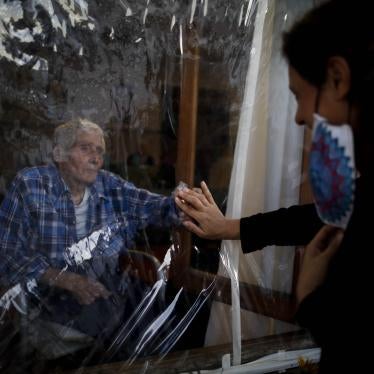https://www.ohchr.org/EN/Issues/Poverty/Pages/callCovid19.aspx
We are writing to share our concerns regarding the protection of older people during the Covid-19 pandemic. These include access to social services, concerns regarding nursing homes, violence against older people, and discriminatory statements by public officials against older people.
Community-based social services
Older people often end up in nursing homes due to governments’ failure to provide sufficient social services for people to live independently in the community, policies that have put millions at added risk of contracting the novel coronavirus because of their institutionalization.
For example, the UK government, instead of improving social care provisions for older people, especially in England, at this time, has instead suspended requirements for social care assessments and services arrangements. Some emergency rules, such as restrictions on public gathering and transport, may be justified amid the continuing spread of the disease. But relaxing rules for assessments and other aspects of social care creates the potential for violations of fundamental human rights.
In Australia, two-thirds of the government’s expenditure on aged care is directed towards institutions rather than community-based and home care services. The total government expenditure on aged care in fiscal year 2017-2018 was AU$18.6 billion (US$12.7 billion), according to the Aged Care Financing Authority, an independent agency providing independent advice to the Australian government on the sustainability of the aged care sector.[1] Of this, 66 percent went to residential care; 12 percent to home care; 17 percent to home support; and 2.7 percent to flexible aged care, such as therapy after hospital stays, rural health, and aged care support and short-term programs.[2]
Recommendations
- Governments should ensure continuity of and expand community-based services so that people do not end up in institutions in the absence of other options.
Concerns regarding nursing homes
During the Covid-19 pandemic, some Australian aged care facilities restricted visitors beyond the Australian government’s public health guidance, which limits visitors to a maximum of two people per visit, requires the visits to be of short duration, and has guidelines on hygiene and physical distancing.
Visitor restrictions by aged care providers can do more harm than good by cutting off older people from vitally important family and social connections. Older people who find themselves unexpectedly alone without control over their circumstances are at particular risk for a variety of severe, even life-threatening physical and mental health conditions, including cognitive decline. Such underlying health conditions are harmful enough on their own, but with a disease that is particularly dangerous for people with them, voluntary lockdowns might not be the answer.
In the United States, there have been high rates of infection and death among nursing home residents during the Covid-19 pandemic. As of June 4, nursing home and long-term care facility residents constituted 45 percent of Covid-19 deaths in 41 states, according to the Kaiser Family Foundation. Over 84 percent of the 1.4 million people living in the 15,500 nursing homes in the US are over age 65. Older people and those with underlying health problems are at increased risk of serious complications from Covid-19 infection.
There are longstanding problems with infection control in US nursing homes. A May 20 US Government Accountability Office (GAO) report on nursing home inspections found that 82 percent of facilities had infection prevention and control violations between 2013 and 2017, prior to the pandemic, despite mandatory federal infection control regulations. The violations included practices that create serious risk of spreading infectious diseases, such as failures to isolate sick residents, or to ensure that staff regularly used proper hand hygiene and masks and other personal protective equipment (PPE) to control the spread of infection. Half of the facilities with violations were found to have repeated shortcomings. Inspectors categorized 52 percent of violations as part of a pattern in the facility or widespread in the facility.
Despite these concerns, the Centers for Medicare & Medicaid Services (CMS), the US agency charged with monitoring nursing homes’ compliance with federal infection control standards, did little to compel nursing homes to improve practices, according to the GAO report. Inspectors categorized the overwhelming majority of infection prevention and control violations as not severe, and in two-thirds of cases did not impose any enforcement actions.
In addition, since the start of the Covid-19 epidemic in the US, oversight of nursing homes has actually declined. CMS issued compulsory instructions to nursing facilities on March 9 requiring them to restrict visitors, except for end-of-life situations. The instructions also required nursing homes to curtail visits by ombudsmen, who normally have the authority to visit nursing homes and other facilities to address complaints and to advocate improvements in the long-term care system.
State lawmakers across the United States are increasingly denying residents of nursing facilities access to legal remedies for harms incurred. Nursing facilities’ longstanding problems managing infection control have put already vulnerable older residents at greater risk of Covid-19 infection.
Nineteen US states have recently enacted laws or state executive orders granting nursing homes protection from civil liability in connection with Covid-19. New York State’s law shielding nursing homes is particularly problematic as it protects nursing homes from both civil and criminal lawsuits, even in some cases of gross negligence. At least five other states are considering similar bills or executive orders, including California and Florida. A national bill limiting legal liability for all businesses, including nursing homes, has been discussed in the US Senate.
A critical step in legal proceedings is discovery, in which parties to a lawsuit exchange documents and information relevant to the case. Granting nursing facilities immunity from lawsuits means that residents and their families may have no way to obtain information about infection prevention, conditions, and treatment inside nursing homes during the Covid-19 pandemic that may have contributed to infection or death.
Recommendations
- Governments have the obligation to protect older residents’ right to health and to private and family life. Nursing home policies should balance protecting older and at-risk residents with their needs for family and connection as well as the important oversight that visitors provide. A more balanced approach to keeping residents and nursing facility staff safe could restrict visitors who are sick, as many facilities already do; strictly supervise visitors’ handwashing and wearing of masks, and social distancing; and have a dedicated room for visiting.
- Governments should ensure consistent, effective oversight of nursing facilities, including enforcement of infection control and other regulations.
- Governments should ensure that older people can access complaint mechanisms and legal remedies.
Violence against older people, particularly older women
Data from the hotline of the Brazil Ministry of Women, Families and Human Rights indicates that the Covid-19 pandemic has brought a significant daily increase in rights abuses against older people, including mistreatment and exposure to health risks. Those who work with victims of domestic violence confirm a rise in violence against older women by their partners, their children, or caregivers. For example, a lawyer at a support center in southern São Paulo City said in the early weeks of the pandemic she helped an older woman whose son had assaulted her, and another whose abusive ex-husband had threatened her during the weeks at the beginning of the pandemic. The proportion of women 60 and over in Brazil’s population has increased in the past decades to 24 percent of women and girls over 15.
In response to the particular obstacles women may face in accessing protection and justice during Covid-19 stay-at-home orders, the public defender’s office in São Paulo State is allowing people to report domestic violence online and requesting that judges issue restraining orders or other protection measures remotely instead of requiring victims to appear in their office.
Recommendations
- Governments should ensure that older women have access to complaint mechanisms, protection measures, and justice, and take age into consideration.
- Governments should collect and make publicly available data on violence against older women. In doing so, governments should ensure that data on violence against older people is disaggregated by gender, and that data on violence against women includes women of all ages, disaggregated by age.
Discriminatory statements by public officials
In addition to the greater risk of severe illness and death from Covid-19, discriminatory attitudes and actions by government officials threaten older people’s rights. For example, in a March 22 interview, Ukraine’s then-health minister said people over 65 are already “corpses” and the government should focus its Covid-19 efforts on people “who are still alive.”
In the United States, the Texas lieutenant governor, Dan Patrick, suggested that older people might be willing to sacrifice themselves to benefit the economy: “My message is that let’s get back to work,” Patrick, 69, said on a national television program on March 23. “Let’s get back to living. Let’s be smart about it, and those of us who are 70-plus, we’ll take care of ourselves, but don’t sacrifice the country.”
Brazil’s President Jair Bolsonaro has openly rejected the government’s duty to protect older people. “Each family has to protect its elderly, not throw that on the State,” he said in a television interview on April 8. Not only was he ignoring the more than four million older people who live alone in Brazil, but he was ignoring the government’s obligations under international human rights law to protect every one, including older people who live with families or in institutions. The pandemic increases the risks to their health, but also to violence, neglect, and other abuses. Government services can extend a lifeline.
Recommendation
- Governments should actively seek to reduce ageism with positive messaging for older people and aging in their communications and policies.
[1] Australian government Aged Care Financing Authority, Sixth Report on the Funding and Financing of the Aged Care Sector 2018, https://agedcare.health.gov.au/sites/g/files/net1426/f/documents/08_2018/acfa-sixth-report-2018-short-report-fa.pdf (accessed August 7, 2019).
[2] Ibid.; Australian Department of Health, “Flexible Care,” https://agedcare.health.gov.au/programs/flexible-care (accessed August 14, 2019).








